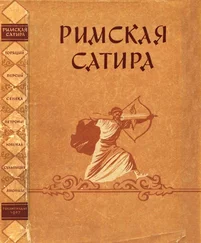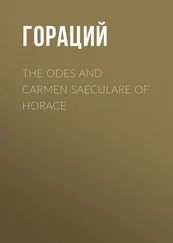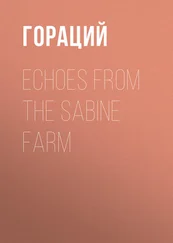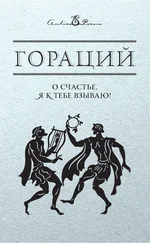Квинт Гораций Флакк - The Works of Horace
Здесь есть возможность читать онлайн «Квинт Гораций Флакк - The Works of Horace» — ознакомительный отрывок электронной книги совершенно бесплатно, а после прочтения отрывка купить полную версию. В некоторых случаях можно слушать аудио, скачать через торрент в формате fb2 и присутствует краткое содержание. Жанр: foreign_poetry, Поэзия, foreign_antique, foreign_prose, на английском языке. Описание произведения, (предисловие) а так же отзывы посетителей доступны на портале библиотеки ЛибКат.
- Название:The Works of Horace
- Автор:
- Жанр:
- Год:неизвестен
- ISBN:нет данных
- Рейтинг книги:3 / 5. Голосов: 1
-
Избранное:Добавить в избранное
- Отзывы:
-
Ваша оценка:
- 60
- 1
- 2
- 3
- 4
- 5
The Works of Horace: краткое содержание, описание и аннотация
Предлагаем к чтению аннотацию, описание, краткое содержание или предисловие (зависит от того, что написал сам автор книги «The Works of Horace»). Если вы не нашли необходимую информацию о книге — напишите в комментариях, мы постараемся отыскать её.
The Works of Horace — читать онлайн ознакомительный отрывок
Ниже представлен текст книги, разбитый по страницам. Система сохранения места последней прочитанной страницы, позволяет с удобством читать онлайн бесплатно книгу «The Works of Horace», без необходимости каждый раз заново искать на чём Вы остановились. Поставьте закладку, и сможете в любой момент перейти на страницу, на которой закончили чтение.
Интервал:
Закладка:
ODE VI.
TO AGRIPPA.
You shall be described by Varius, a bird of Maeonian verse, as brave, and a subduer of your enemies, whatever achievements your fierce soldiery shall have accomplished, under your command; either on ship-board or on horseback. We humble writers, O Agrippa, neither undertake these high subjects, nor the destructive wrath of inexorable Achilles, nor the voyages of the crafty Ulysses, nor the cruel house of Pelops: while diffidence, and the Muse who presides over the peaceful lyre, forbid me to diminish the praise of illustrious Caesar, and yours, through defect of genius. Who with sufficient dignity will describe Mars covered with adamantine coat of mail, or Meriones swarthy with Trojan dust, or the son of Tydeus by the favor of Pallas a match for the gods? We, whether free, or ourselves enamored of aught, light as our wont, sing of banquets; we, of the battles of maids desperate against young fellows—with pared nails.
ODE VII.
TO MUNATIUS PLANCUS.
Other poets shall celebrate the famous Rhodes, or Mitylene, or Ephesus, or the walls of Corinth, situated between two seas, or Thebes, illustrious by Bacchus, or Delphi by Apollo, or the Thessalian Tempe. There are some, whose one task it is to chant in endless verse the city of spotless Pallas, and to prefer the olive culled from every side, to every other leaf. Many a one, in honor of Juno, celebrates Argos, productive of steeds, and rich Mycenae. Neither patient Lacedaemon so much struck me, nor so much did the plain of fertile Larissa, as the house of resounding Albunea, and the precipitately rapid Anio, and the Tiburnian groves, and the orchards watered by ductile rivulets. As the clear south wind often clears away the clouds from a lowering sky, now teems with perpetual showers; so do you, O Plancus, wisely remember to put an end to grief and the toils of life by mellow wine; whether the camp, refulgent with banners, possess you, or the dense shade of your own Tibur shall detain you. When Teucer fled from Salamis and his father, he is reported, notwithstanding, to have bound his temples, bathed in wine, with a poplar crown, thus accosting his anxious friends: "O associates and companions, we will go wherever fortune, more propitious than a father, shall carry us. Nothing is to be despaired of under Teucer's conduct, and the auspices of Teucer: for the infallible Apollo has promised, that a Salamis in a new land shall render the name equivocal. O gallant heroes, and often my fellow-sufferers in greater hardships than these, now drive away your cares with wine: to-morrow we will re-visit the vast ocean."
ODE VIII.
TO LYDIA.
Lydia, I conjure thee by all the powers above, to tell me why you are so intent to ruin Sybaris by inspiring him with love? Why hates he the sunny plain, though inured to bear the dust and heat? Why does he neither, in military accouterments, appear mounted among his equals; nor manage the Gallic steed with bitted reins? Why fears he to touch the yellow Tiber? Why shuns he the oil of the ring more cautiously than viper's blood? Why neither does he, who has often acquired reputation by the quoit, often by the javelin having cleared the mark, any longer appear with arms all black-and-blue by martial exercises? Why is he concealed, as they say the son of the sea-goddess Thetis was, just before the mournful funerals of Troy; lest a manly habit should hurry him to slaughter, and the Lycian troops?
ODE IX.
TO THALIARCHUS.
You see how Soracte stands white with deep snow, nor can the laboring woods any longer support the weight, and the rivers stagnate with the sharpness of the frost. Dissolve the cold, liberally piling up billets on the hearth; and bring out, O Thaliarchus, the more generous wine, four years old, from the Sabine jar. Leave the rest to the gods, who having once laid the winds warring with the fervid ocean, neither the cypresses nor the aged ashes are moved. Avoid inquiring what may happen tomorrow; and whatever day fortune shall bestow on you, score it up for gain; nor disdain, being a young fellow, pleasant loves, nor dances, as long as ill-natured hoariness keeps off from your blooming age. Now let both the Campus Martius and the public walks, and soft whispers at the approach of evening be repeated at the appointed hour: now, too, the delightful laugh, the betrayer of the lurking damsel from some secret corner, and the token ravished from her arms or fingers, pretendingly tenacious of it.
ODE X.
TO MERCURY.
Mercury, eloquent grandson of Atlas, thou who artful didst from the savage manners of the early race of men by oratory, and the institution of the graceful Palaestra: I will celebrate thee, messenger of Jupiter and the other gods, and parent of the curved lyre; ingenious to conceal whatever thou hast a mind to, in jocose theft. While Apollo, with angry voice, threatened you, then but a boy, unless you would restore the oxen, previously driven away by your fraud, he laughed, [when he found himself] deprived of his quiver [also]. Moreover, the wealthy Priam too, on his departure from Ilium, under your guidance deceived the proud sons of Atreus, and the Thessalian watch-lights, and the camp inveterate agaist Troy. You settle the souls of good men in blissful regions, and drive together the airy crowd with your golden rod, acceptable both to the supernal and infernal gods.
ODE XI.
TO LEUCONOE.
Inquire not, Leuconoe (it is not fitting you should know), how long a term of life the gods have granted to you or to me: neither consult the Chaldean calculations. How much better is it to bear with patience whatever shall happen! Whether Jupiter have granted us more winters, or [this as] the last, which now breaks the Etrurian waves against the opposing rocks. Be wise; rack off your wines, and abridge your hopes [in proportion] to the shortness of your life. While we are conversing, envious age has been flying; seize the present day, not giving the least credit to the succeeding one.
ODE XII.
TO AUGUSTUS.
What man, what hero, O Clio, do you undertake to celebrate on the harp, or the shrill pipe? What god? Whose name shall the sportive echo resound, either in the shady borders of Helicon, or on the top of Pindus, or on cold Haemus? Whence the woods followed promiscuously the tuneful Orpheus, who by his maternal art retarded the rapid courses of rivers, and the fleet winds; and was so sweetly persuasive, that he drew along the listening oaks with his harmonious strings. But what can I sing prior to the usual praises of the Sire, who governs the affairs of men and gods; who [governs] the sea, the earth, and the whole world with the vicissitudes of seasons? Whence nothing is produced greater than him; nothing springs either like him, or even in a second degree to him: nevertheless, Pallas has acquired these honors, which are next after him.
Neither will I pass thee by in silence, O Bacchus, bold in combat; nor thee, O Virgin, who art an enemy to the savage beasts; nor thee, O Phoebus, formidable for thy unerring dart.
I will sing also of Hercules, and the sons of Leda, the one illustrious for his achievements on horseback, the other on foot; whose clear-shining constellation as soon as it has shone forth to the sailors, the troubled surge falls down from the rocks, the winds cease, the clouds vanish, and the threatening waves subside in the sea—because it was their will. After these, I am in doubt whom I shall first commemorate, whether Romulus, or the peaceful reign of Numa, or the splendid ensigns of Tarquinius, or the glorious death of Cato. I will celebrate, out of gratitude, with the choicest verses, Regulus, and the Scauri, and Paulus, prodigal of his mighty soul, when Carthage conquered, and Fabricius.
Severe poverty, and an hereditary farm, with a dwelling suited to it, formed this hero useful in war; as it did also Curius with his rough locks, and Camillus. The fame of Marcellus increases, as a tree does in the insensible progress of time. But the Julian constellation shines amid them all, as the moon among the smaller stars. O thou son of Saturn, author and preserver of the human race, the protection of Caesar is committed to thy charge by the Fates: thou shalt reign supreme, with Caesar for thy second. Whether he shall subdue with a just victory the Parthians making inroads upon Italy, or shall render subject the Seres and Indians on the Eastern coasts; he shall rule the wide world with equity, in subordination to thee. Thou shalt shake Olympus with thy tremendous car; thou shalt hurl thy hostile thunderbolts against the polluted groves.
Читать дальшеИнтервал:
Закладка:
Похожие книги на «The Works of Horace»
Представляем Вашему вниманию похожие книги на «The Works of Horace» списком для выбора. Мы отобрали схожую по названию и смыслу литературу в надежде предоставить читателям больше вариантов отыскать новые, интересные, ещё непрочитанные произведения.
Обсуждение, отзывы о книге «The Works of Horace» и просто собственные мнения читателей. Оставьте ваши комментарии, напишите, что Вы думаете о произведении, его смысле или главных героях. Укажите что конкретно понравилось, а что нет, и почему Вы так считаете.






